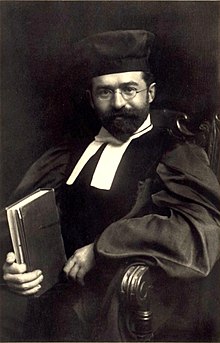Joseph Hertz
Joseph Hermann Hertz or Joseph Herman Hertz (born September 25, 1872 in Rebrin, Kingdom of Hungary , now Slovakia , † January 14, 1946 in London ) was Chief Rabbi of the united Jewish communities of the British Commonwealth from 1913 until his death .
life and work
Joseph Hertz, son of a rabbi, came to the United States at the age of twelve, where he became the first graduate of the Jewish Theological Seminary of America in 1894 . After two years as a rabbi in Syracuse , he was appointed rabbi of the Witwatersrand community near Johannesburg in South Africa in 1896. After he publicly spoke out against the Boers' discrimination against foreigners and religious minorities , he was deported from 1899 to 1901 , but returned to his post at the end of the Boer War . In 1911 he became rabbi of the Orach Chaim Orthodox community in New York .
In 1913 he was elected Chief Rabbi of Great Britain to succeed Hermann Adler . In this position, which he held until his death, he was confronted with numerous insoluble difficulties: This period spanned two world wars, the Holocaust and, last but not least, the destruction of the Great Synagogue in London , where he officiated, in 1940 by German air raids . Together with Chaim Weizmann , the Central British Fund for German Jewry (CBF), the Germany Emergency Committee of the Quakers and others, he was involved in gaining approval from the British government for Aktion Kindertransport .
Apart from his doctoral thesis on the ethical system of the religious philosopher James Martineau , most of his writings are kept in a popular science style, but filled a heartfelt void. They have been reprinted hundreds of thousands of times and translated into numerous languages. His commentaries on the Pentateuch and the prayer book are still in use today.
Public work
As a representative of Orthodox Judaism , Joseph Hertz fought Reform Judaism , but supported Zionism and in this way influenced the negotiations that led to the signing of the Balfour Declaration in 1917 . He also influenced public opinion through occasional letters to the editor in the London Times . An example of this is his letter to the editor of May 28, 1917, when he spoke out against the attack on Zionism by two leading representatives of British Jewry, Claude JG Montefiore and DL Alexander.
In the 1920s, Hertz reached out to leading Jewish and Christian clergy to oppose the planned introduction of the world calendar by the League of Nations . The stumbling block in this calendar reform was the intended introduction of an eight-day week once or twice a year, which would have meant that the Jewish Sabbath or Christian Sunday would have fallen on different days of the week.
Hertz was a member of the Board of Governors of the Hebrew University of Jerusalem , President of the Jewish Peace Society, an employee of the Jewish Encyclopedia , the Encyclopaedia Britannica and was a member of the Board of Translators of the American-Jewish Bible Version 1903-1906 on the American-Jewish translation of the Bible . In 1942 he founded the Council of Christians and Jews together with the Archbishop of Canterbury William Temple . In 1943 he became the first British rabbi to be named Companion of Honor .
Works
- The ethical System of James Martineau, 1894
- Bachya, the Jewish Thomas a Kempis, 1898
- The Jew in South-Africa, 1905
- The Book of Jewish Thoughts, 2nd ed. 1920. German under the title Jüdische Denkungen über das Judaism , translated by Rosalie Perles, 1924
- The Pentateuch and the Haftorahs (5 volumes), 1929-1936
- Sermons, Adresses and Studies (3 volumes), 1938
- The Prayer Book, 1942-1945
- The Pentateuch and Haftarot in German in 5 volumes available from Verlag Morascha, Basel
literature
- Encyclopaedia Judaica , Seventh Volume, pp. 1213-1214. Berlin 1932
- Encyclopaedia Judaica, Second Edition, Vol. 9, pp. 48-49
Web links
- Foreword to Soncino Talmud (Engl.)
- Sabbath, Festival and Fast in Judaism
- Office of the Chief Rabbi: Past Chief Rabbis ( Memento from July 17, 2013 in the Internet Archive ) - Information on Joseph Herman Hertz 1913 - 1946 (English)
Individual evidence
- ^ "Chief Rabbi of the United Hebrew Congregations"
- ↑ A momentous day that kickstarted the Kindertransport , accessed April 2, 2019.
| personal data | |
|---|---|
| SURNAME | Hertz, Joseph |
| ALTERNATIVE NAMES | Hertz, Joseph Hermann; Hertz, Joseph Herman |
| BRIEF DESCRIPTION | Chief Rabbi of the United Jewish Congregations of the British Commonwealth |
| DATE OF BIRTH | September 25, 1872 |
| PLACE OF BIRTH | Rebrin, Kingdom of Hungary , now Slovakia |
| DATE OF DEATH | January 14, 1946 |
| Place of death | London |
